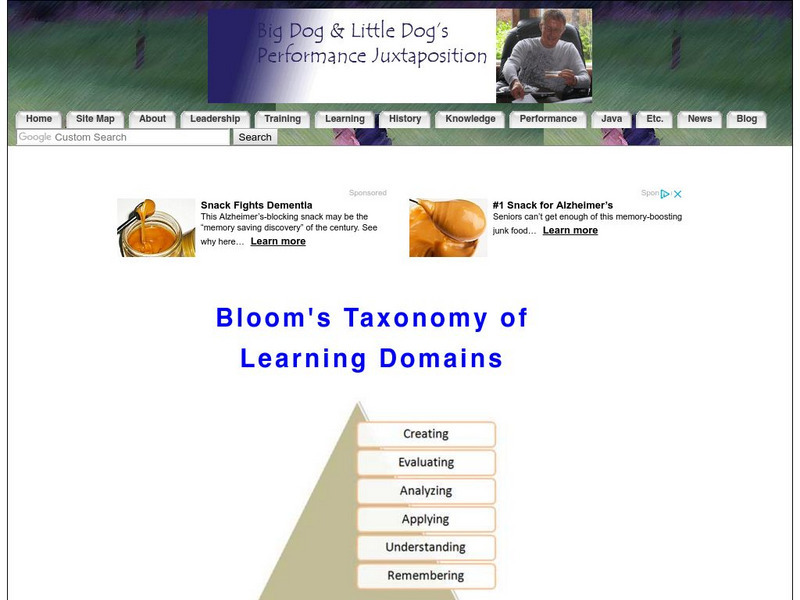Curated OER
Knowledge or Instinct? Jack London's "To Build a Fire"
Students examine the relationship of man and nature in "To Build a Fire" and discuss the juxtaposition of knowledge and instinct. They investigate third person, omniscient point of view.
Curated OER
Knowledge or Instinct? Jack London's "To Build a Fire"
Students closely read " To Build a Fire," to explore the use of narrative point of view and debate the distinction between knowledge and instinct. The elements of literary naturalism and how they relate to Jack London's work is examined...
Curated OER
Knowledge test 4
In this knowledge worksheet, students choose the correct word to complete the sentences about Elvis Presley, Thanksgiving, London, and more. Students complete 10 multiple choice questions.
Curated OER
Mapping Out a Trip to Mars
Students create a thinking web about Mars. In this exploratory lesson students pretend they are going to Mars and use a worksheet to answer questions about why they would visit and what they would bring.
Curated OER
Doors to Knowledge
Students identify symbols on a pylon and explain why the names of the Great TEachers the symbols represent. They interpret what religion is to them and sing a song about religion lead by the teacher. Finally, students construct a...
Curated OER
Pa Pa Paa! Quiz
Students participate in an activity in which they consolidate the information they have gained from the previous lessons. They complete a quiz and discuss the answers they chose.
Curated OER
The Moon is made of Cheese
Eighth graders explore the reasons why they believe scientific ideas are true. They think critically rather than accept everything they are told without question.
Boston University
Boston University: The Paideia Project: Kant, the Body, and Knowledge
Discusses the significance of Kant's interest in cosmology and Newtonian mechanics. Relates Kant's beliefs about how mind and body interacted to his more influential epistemology. Article has a historical perspective and is quite readable.
Indiana University
Indiana University: Science vs. Non Science
This mini-lesson at the Evolution and Nature of Science Institute site from Indiana University provides a criteria by which students can evaluate an idea or explanation for scientific credibility.
University of Illinois
University of Illinois Extension: Character Education "You Tell Me"
Excellent classroom activities for building students' character. Helps with students' comprehension skills, higher-order thinking skills, knowledge and inference skills, grammar and usage. Good resource.
University of Illinois
University of Illinois Extension: Character Education "Beauty"
Excellent resource for empowering students to become better learners. This lesson includes promoting cooperative learning, encouraging the integration of knowledge and creativity, the importance of looking beyond the physical, and the...
University of Illinois
University of Illinois Extension: Character Education "If I Wasn't Me"
Excellent resource for empowering students to become better learners. This lesson includes encouraging students to use their knowledge and metacognition, as well as helping students implement reading, writing, and thinking connections...
Other
Fagler College/nas 111/scientific Methodology
Power Point presentation on scientific method for NAS 102 Human and Environmental Biology II.
Other
Csicop: Field Guide to Critical Thinking
This article, originally published in Skeptical Inquirer, outlines some of the key components of the scientific problem-solving process while addressing the many reasons for the popularity of paranormal beliefs in the U.S. (Published in...
CommonLit
Common Lit: Themes: Education & Knowledge: What Is the Goal of Education?
This is a collection of Grade-Leveled texts (3-12) to address the question, "What is the goal of education?" Select a grade level and a collection of on grade-level reading passages on the topic comes up. [Free account registration...
Boston University
Boston University: Belief Worlds and Epistemic Possibilities
This site from the Boston University argues that belief, and not only knowledge, can establish epistemic possibilities for an individual. Redescribes knowledge as an "ability to shift attention among our various belief worlds."
Indiana University
Indiana University: Ensi Sensi/nature of Modern Science
This paper by Martin Nickels includes a section titled "The Uncertainty & Limits of Scientific Knowledge."
Other
Free Univ. Of Brussels: Introduction to Epistemology
The original interpretation of the history of epistemology considered in light of modern evolutionary theory and cybernetics models. Despite this inclination, the author presents a fair and useful overview of that history with helpful...
Other
Papa Jan: Five Essential Components of Reading
Can you name the five essential components of reading? Check out this informative site from Papa Jan.com to learn more about phonemic awareness, phonics, reading fluency, vocabulary development and reading comprehension.
New Advent
Catholic Encyclopedia: Epistemology
Wonderful introduction to the topic. Historical overview up to Descartes summarizes epistemological questions in ancient and classical thought. From there, lists the contemporary problems of epistemology that follow after Cartesian...
Donald Clark
Bloom's Taxonomy of Learning Domains
This article--in text and charts--explains the three learning domains devised by Benjamin Bloom.
Quia
Quia: Nature of Science Scientific Method Concentration
Play a game of concentration by matching terms used in the scientific method to their proper description.
Quia
Quia: Nature of Science Scientific Method Flashcards
Review the nature of science with on-line flash cards.
AdLit
Ad lit.org: Knowledge in the Classroom
Learning happens when we connect new information to what we already know. When children have limited knowledge about the world, they have a smaller capacity to learn more about it. Here are four ways teachers can build content knowledge...
























